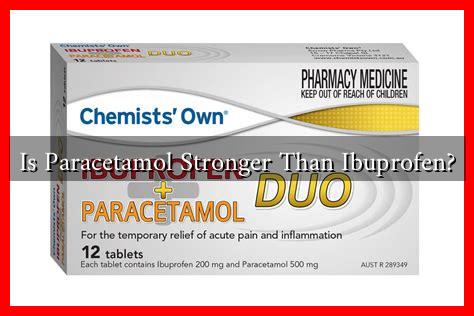-
Table of Contents
Is Paracetamol Stronger Than Ibuprofen?
When it comes to pain relief, two of the most commonly used over-the-counter medications are paracetamol (also known as acetaminophen) and ibuprofen. Both are effective in alleviating pain and reducing fever, but they work in different ways and have distinct properties. This article explores the differences between paracetamol and ibuprofen, helping you understand which might be stronger or more suitable for your needs.
Understanding Paracetamol and Ibuprofen
Before diving into a comparison, it’s essential to understand what each medication is and how it functions.
- Paracetamol: This medication is primarily used to relieve mild to moderate pain and reduce fever. It is often recommended for headaches, muscle aches, arthritis, backaches, toothaches, colds, and fevers.
- Ibuprofen: This is a nonsteroidal anti-inflammatory drug (NSAID) that not only alleviates pain but also reduces inflammation. It is commonly used for conditions like arthritis, menstrual cramps, and other inflammatory conditions.
Mechanism of Action
The way these medications work in the body is crucial to understanding their effectiveness.
- Paracetamol: It is believed to work by inhibiting the production of prostaglandins in the brain, which are chemicals that promote inflammation, pain, and fever. However, its exact mechanism is not fully understood.
- Ibuprofen: As an NSAID, ibuprofen works by blocking the enzymes (COX-1 and COX-2) responsible for the production of prostaglandins throughout the body. This action not only reduces pain and fever but also addresses inflammation directly.
Comparative Effectiveness
Determining whether paracetamol is stronger than ibuprofen depends on the type of pain being treated.
- For Mild Pain: Both medications are effective for mild pain relief, such as headaches or minor aches. However, some studies suggest that ibuprofen may provide slightly better relief for certain types of pain due to its anti-inflammatory properties.
- For Inflammatory Pain: Ibuprofen is generally more effective for pain associated with inflammation, such as arthritis or sports injuries. Its ability to reduce inflammation makes it a preferred choice in these cases.
- For Fever Reduction: Both medications are effective at reducing fever, but paracetamol is often recommended for children due to its safety profile.
Side Effects and Safety
While both medications are generally safe when used as directed, they come with potential side effects.
- Paracetamol: Overdose can lead to severe liver damage, making it crucial to adhere to recommended dosages. It is usually considered safe for most people, including pregnant women, when taken appropriately.
- Ibuprofen: This medication can cause gastrointestinal issues, such as ulcers or bleeding, especially with long-term use. It may also affect kidney function and is not recommended for individuals with certain pre-existing conditions.
Case Studies and Statistics
Research has shown varying results regarding the effectiveness of paracetamol versus ibuprofen. A systematic review published in the British Medical Journal found that ibuprofen was more effective than paracetamol for treating pain after dental surgery. Another study indicated that combining both medications could provide superior pain relief compared to either drug alone.
Conclusion
In summary, whether paracetamol is stronger than ibuprofen largely depends on the context of use. For mild pain relief, both medications are effective, but ibuprofen may have the edge when dealing with inflammatory pain. It is essential to consider individual health conditions and consult with a healthcare professional when choosing between these medications. Always adhere to recommended dosages to minimize the risk of side effects. Ultimately, understanding the differences between paracetamol and ibuprofen can empower you to make informed decisions about your pain management.

